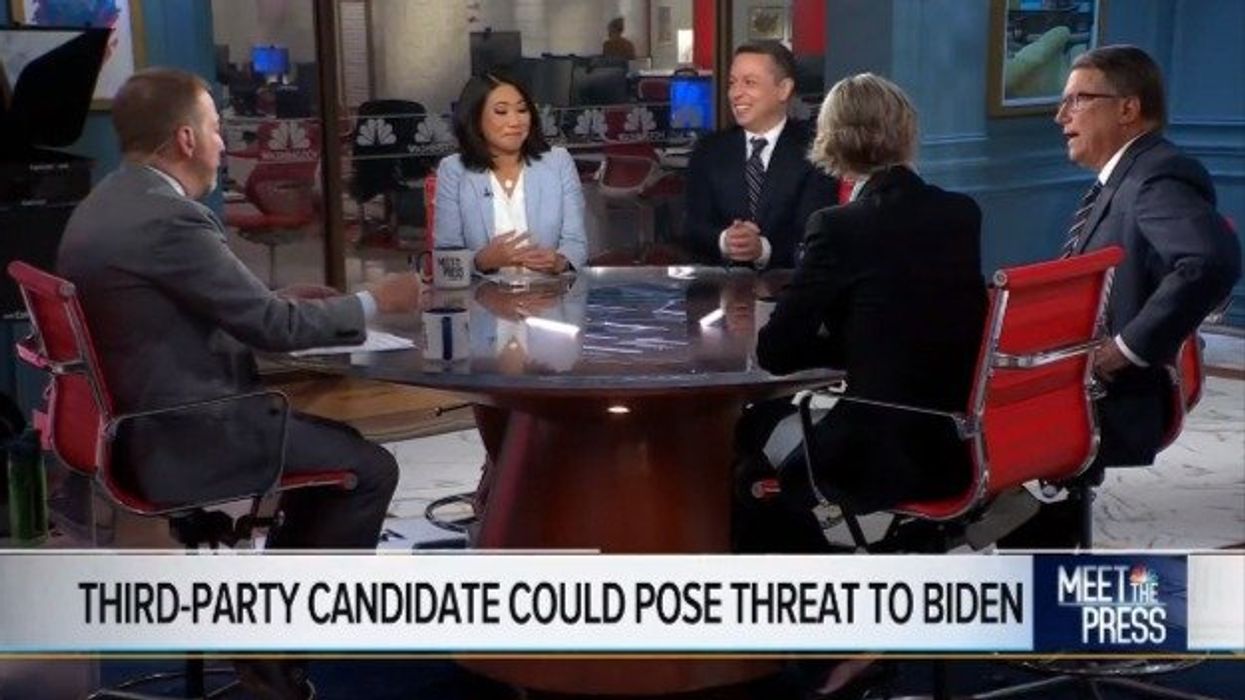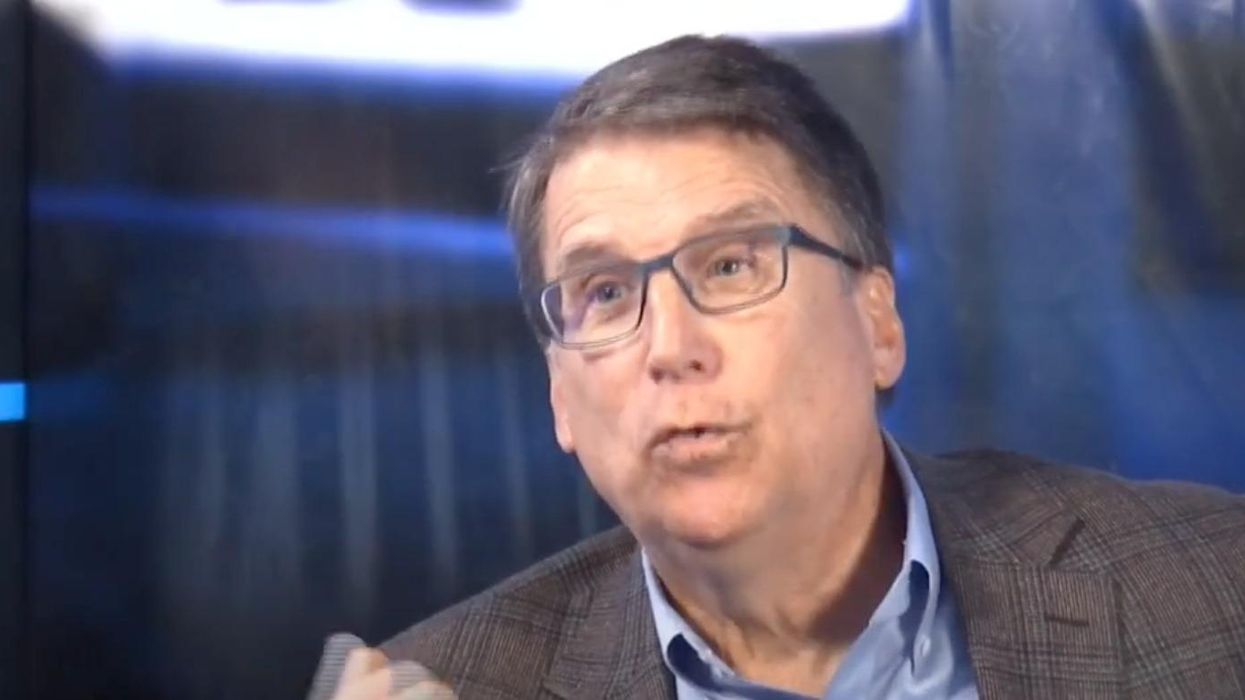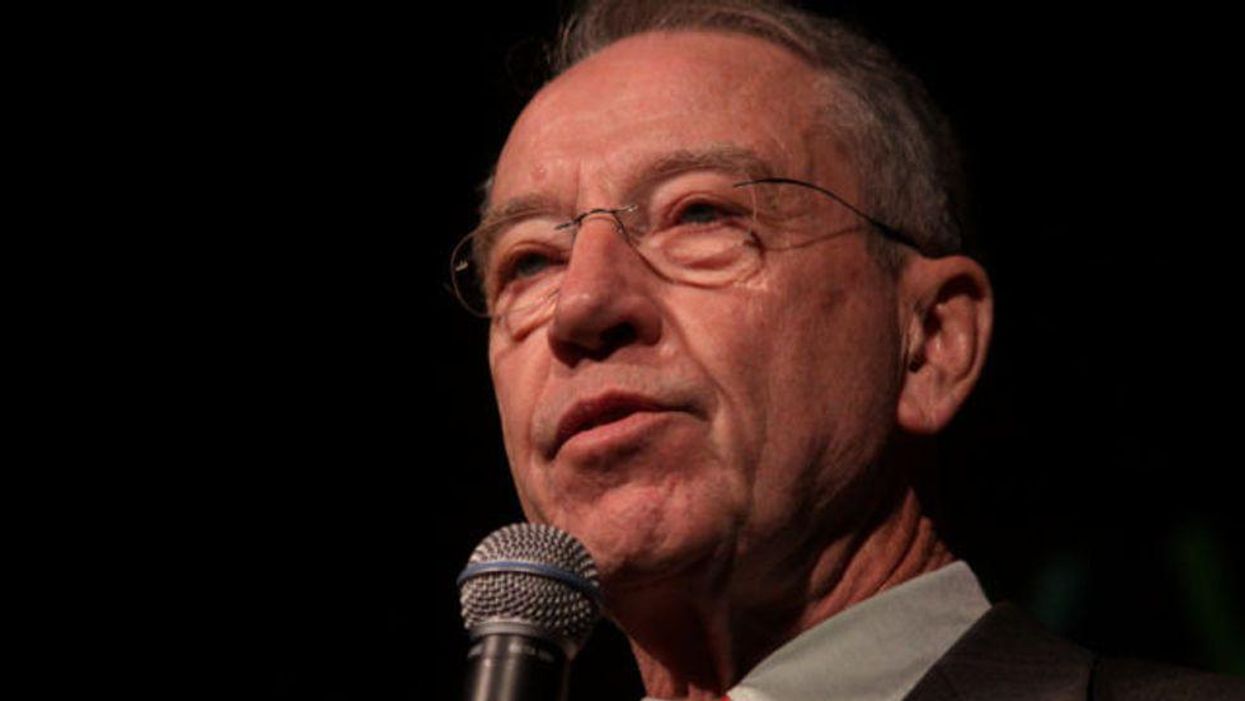Why There's No Place for 'No Labels' In 2024
Third parties are just not a thing in American presidential politics. The first-past-the-post nature of our system means that without supplanting one of the major parties, the best-case scenario for any third-party candidate is to play the spoiler.
So why engage in such a futile endeavor? One obvious reason is to use the high-profile nature of the campaign to bring attention to one’s pet issues. This is why Ralph Nader or Cornel West might throw their hat in the ring: Their need to promote themselves and their causes trumps any negative consequences of their quixotic campaigns. In the case of Nader, he played spoiler and we got George W. Bush and an endless war. We could have had a climate champion instead in Al Gore.
But let’s be clear: No Labels is not that. The fledgling “political party” doesn't have a message to sell. Their name literally says, “We stand for nothing.” Theirs is a more cynical pursuit: a bunch of washed-up, loser politicians grifting conservative billionaires out of millions, using ridiculous and easily refuted arguments to line their pockets and pretend to retain some semblance of relevance.
This was all clear as I faced off with No Labels Co-chair Pat McCrory, the transphobic former governor of North Carolina, this past weekend on “Meet the Press.”
The core of the argument is encapsulated in this tweet:
Here’s the transcript of the broader exchange:
CHUCK TODD: Welcome back. So let's look at a Biden general election campaign and this idea of a third party. Pat, you are a big part of No Labels. You guys are recruiting candidates. What is this ticket going to look like, and is this a 100% commitment that there is going to be a ticket from No Labels?PAT McCRORY: Well, Nikki Haley in the debate confirmed that 65% of the people are disgusted with both Trump and Biden being our only choices. They're asking, "Isn't America better than this? Can't we have a better choice?" And the momentum, the movement of No Labels is on fire right now. People are looking for another potential candidate --
CHUCK TODD: I get that people don't want --
PAT McCRORY: And I know -- wait a minute. There are a lot of people --
MARKOS MOULITSAS: No, there are not.
PAT McCRORY: There are a lot of people --
MARKOS MOULITSAS: No, there are not.
PAT McCRORY: There are a lot of people – I'm telling you right now. A lot of people who predicted Trump would never be president are the same people who are saying, "There's no way in hell a third party can win." I'm telling you. We've never had 65% --
CHUCK TODD: Go, Markos.
PAT McCRORY: – of the people disgusted --
MARKOS MOULITSAS: So, No Labels --
PAT McCRORY: – with both parties.
MARKOS MOULITSAS: – is literally a movement that says, "We stand for nothing." Imagine going to Walmart --
PAT McCRORY: That is so –
MARKOS MOULITSAS: – or Target and seeing no labels on a product.
PAT McCRORY: You haven't read obviously the –
MARKOS MOULITSAS: The products are the problem.
PAT McCRORY: – 30-issue statement --
MARKOS MOULITSAS: No, here.
PAT McCRORY: – of No Labels.
MARKOS MOULITSAS: The issue statement ignores abortion. And it has such --
PAT McCRORY: You missed the whole --
MARKOS MOULITSAS: – barn-burning issues such as medical --
PAT McCRORY: You never read it.
MARKOS MOULITSAS: – tort reform. That'll light up the audience.
PAT McCRORY: You have not read it.
MARKOS MOULITSAS: So the –
PAT McCRORY: He hasn’t read it.
MARKOS MOULITSAS: – reality is it's finance-industry heavy. Oh, I read it. No, I actually did read it. I read it last night.
DANIELLE PLETKA: That's why he couldn't sleep.
MARKOS MOULITSAS: Yeah, really.
PAT McCRORY: Well, Nikki Haley --
MARKOS MOULITSAS: So …
PAT McCRORY: – basically repeated the No Labels agenda --
MARKOS MOULITSAS: So the problem isn't they don't like Biden or Trump. It's that you are creating this idea that there's a mythical unicorn creature that will agree with these people who want something else. That doesn't exist. When [Monmouth] polled Manchin and Huntsman, it's like what? 12% --
Let’s run down the arguments.
There’s broad “disgust” with both Trump and Biden.
Yes, neither is particularly popular with the broader electorate in our deeply polarized society, but both are actually popular within their own parties.
Trump is at 34 percent -58 percent among independents, while Biden is at 32 percent --60 percent. Is there “disgust” there? Maybe. But it’s not a unanimous opinion. Left-leaning independents might pine for Bernie Sanders while center-right, never-Trump independents might pine for Mitt Romney. Far-right nuts might want … Ted Nugent? This is an important point, which we’ll return to in a bit.
A bit later in the show, I was asked why there wasn’t a real Democratic primary. “Biden's actually very popular among Democrats. In Civiqs polling—Civiqs with a ‘q’—Biden is sitting around 80% with Democrats,” I said, underplaying Biden’s actual support of 83%. “There's no space. You think there's no space for an anti-Trump? There's really no space for an anti-Biden.”
If you watch the segment, the whole panel—including supposed Democrat Stephanie Murphy, a former congresswoman from Florida—scoffed. They thought it was so ludicrous that anyone would have a favorable opinion of Biden despite the overwhelming evidence in the polling. Do some people wish their favorite Democrat were the nominee instead of Biden? Of course! But that’s a far cry from “disgust.” And yes, all three had stories about how their social circles didn’t like Biden, but the D.C.-groupthink was strong.
And if you think I’m biasing Biden’s numbers by pointing to our very own Civiqs polling, Gallup just asked respondents whether they approved of the way Joe Biden is handling his job as president. Among Democrats a whopping 87 percent approved, even higher than in Civiqs polling. This is not controversial. The data is clear.
“There are a lot of people—I'm telling you right now,” McCrory said. “A lot of people who predicted Trump would never be president are the same people who are saying, ‘There's no way in hell a third party can win.’ I'm telling you. We've never had 65% of the people disgusted with both parties.”
Okay, that’s different than Biden versus Trump. That’s talking about the parties. Let’s take a look, shall we?
Among Democrats, 81 percent approve of the Democratic Party, which is shocking given the real problems with our party. The party brand is shit among independents at 24-65, but we know that. It’s why we lose elections in places that should naturally be Democratic, like poor rural counties.
Overall, the Democratic Party approval rating is 38-55. Horrible! But I’d rather have those numbers than the Republican favorability rating among all Americans: 27-64. Ouch. It is only 66-20 approval among Republicans, probably because Trump does such a good job of trashing every other Republican. Among independents it’s 17-70. Brutal.
Still, trying to extrapolate the idea that “voters will support my third party” from those numbers is absurd. The reason the Republican Party favorables among Republicans are so low is because some are angered by the MAGA takeover of the party while others think the party isn’t MAGA enough. Meanwhile, the Democratic Party’s numbers among Democrats are high because we are unified to an unprecedented level—but there are still those who wish we were more like Sanders, and a smaller but still real crowd who wishes we were more “centrist.”
There are a million opinions in politics and you can’t shoehorn them all into two parties. But here’s the thing: You can’t shoehorn them into three parties, either—not without a major realignment.
McCrory then pushes back against my rational notion that a party that is called “No Labels,” which literally means, “we stand for nothing,” actually stands for nothing. He pushes their 30-point platform with such great ideas as number one: “America can’t solve its biggest problems and deliver the results hardworking taxpayers want, need, and deserve unless Democrats and Republicans start working together side by side on bipartisan solutions.” How is a third party going to get the two other parties to work together? And seriously, Democrats have a pathological desire to engage in bipartisanship. The problem there is one-sided. It is Republicans who refuse to engage. (And honestly, I don’t blame them! Parties are supposed to disagree! Let the voters decide which vision to follow.)
Or how about, “National service could help heal America’s political divide.” And then there’s, “It’s in America’s interest to work with our allies to advance our mutual interests.”
I mean, it’s pablum! And if you’re looking for substance on actual issues, forget it. Abortion?* “America must strike a balance between protecting women’s rights to control their own reproductive health and our society’s responsibility to protect human life.” That’s how they manage to talk about abortion without taking an actual position on it. The “balanced” position was Roe v. Wade. If they really wanted to “strike a balance,” all they’d have to say is, “Return to the Roe v. Wade standard.” But they don’t.
Indeed, “No Labels” is an apt name as they don’t actually create an ideological framework that sets them apart from the two main parties. Did you know that they’re also against crime (idea eight) and want our students to be number one (idea thirteen)? Everyone says that, and everyone (mostly) means it! The question is how we get there. And if you think their detailed explanation of their ideas provides more substance, think again. In idea 13, their proposal is to spend more time “reaching for excellence,” and they think, “Our next president should send a signal to us and the world that America is embarking on a national goal to make our students number one in math and reading within a decade.” Well that’s easy! Just send a signal!
Ultimately there’s one big point when talking about third parties, and here it is:
MARKOS MOULITSAS: So the problem isn't they don't like Biden or Trump. It's that you are creating this idea that there's a mythical unicorn creature that will agree with these people who want something else. That doesn't exist. When [Monmouth] polled Manchin and Huntsman, it's like what? 12% --
There are myriad reasons for rejecting the two major parties and their two likely nominees. There isn’t a gap in the ideological spectrum just waiting to be filled by someone who proudly proclaims his strong support for medical tort reform (idea five). Their attempts to sidestep difficult issues like abortion, gun control, and democracy simply mean that anyone who cares about those issues will stick with the major parties since Republicans and Democrats aren’t shy about where they stand on those critical issues.
No Labels likes to quote polls that show a generic third-party candidate as competitive in a presidential matchup against Biden and Trump. Those polls are useless for two reasons: 1) an unnamed candidate who people can imagine as their ideal will always poll better against an actual human with actual positions on things people care about, and 2) third parties always poll better than they perform in actual elections.
On the first point, we have recent proof thanks to a recent Monmouth University poll.
First they asked about a Biden-Trump matchup:
- Biden: 47
- Trump: 40
Then they added a generic third-party candidate:
- Biden: 37
- Generic: 30
- Trump: 28
Finally, they gave us names for the third party—a “fusion” ticket featuring Democrat Sen. Joe Manchin and Republican former Gov. Jon Huntsman:
- Biden: 40
- Trump: 34
- Manchin: 16
A generic candidate takes 10 points from Biden and 12 points from Trump. An actual name takes 7 points from Biden and 6 points from Trump.
But here’s where the poll gets extra interesting: Monmouth then added a question about voting for a spoiler candidate.
Asked if a third-party vote would spoil the election and lead to a Biden victory:
- Biden: 39
- Trump: 37
- Manchin: 20
In other words, if people think their third-party vote helps Biden, they’re more likely to vote third party and Trump notches his best three-way numbers. But … if told their vote for a third party would benefit Trump, check it out:
- Biden: 43
- Trump: 33
- Manchin: 20
People don’t want Trump to win, and this gives us Biden’s most comfortable winning margin.
And of course, Manchin wouldn’t come anywhere near 20 percent. Meet the Press moderator Todd directly pointed this out to McCrory using my “unicorn” frame:
CHUCK TODD: Pat, can you give us some names? Because, you know, Manchin and Huntsman, that's not going to get you your unicorn. What other candidates --
PAT McCRORY: I'm just saying, I don't think there's going to be a shortage --
CHUCK TODD: Is Will Hurd one of your candidates?
PAT McCRORY: I don't think there'll be a shortage of candidates --
CHUCK TODD: Why can't you guys name some names?
MARKOS MOULITSAS: Who is it?
This was a huge messaging victory. The biggest political show on television just flipped the No Labels discussion frame from “people want a third party candidate” to, “Oh yeah? So who is your unicorn?” As McCrory showed, they have no answer for that because the second anyone floats a name, any potential support will quickly evaporate under the inevitable scrutiny and attacks from multiple sides.
That’s not a bad thing! If someone claims that they can fill a massive, unsatisfied percentage of the electorate, then they’ll have to prove it. And there isn’t a single person who can pull that off. It certainly won’t be former Rep. Will Hurd. And if it is? Well, having someone run third party who explicitly calls himself a Republican is fine with me. Let the right split their vote as many ways as possible.
If Republican billionaires like Justice Clarence Thomas’ sugar daddy Harlan Crow want to shower $70 million on No Labels to run a Republican spoiler candidate, more power to them.
(*Fact checking myself: I was wrong in saying that their platform doesn’t mention abortion. In my prep, I jotted down that they “don’t take a position” because they don’t. It just came out wrong in the moment.)
Reprinted with permission from Daily Kos.












